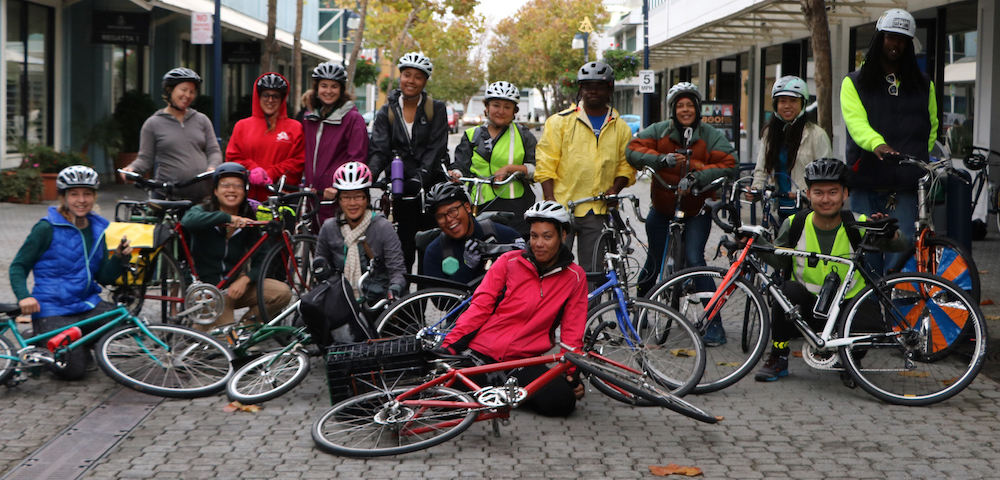EBBC Members and Coalition Partners:
 This morning the House Transportation & Infrastructure Committee eliminated dedicated funding for bike/ped projects in the Federal Transportation Bill. Tomorrow, Friday Feb 3, the House Ways & Means Committee takes up the Bill and they are taking an all out assault on transit and also eliminated bike/ped funding. In an unprecedented move, the Ways and Means Committee is kicking transit funding out of the Highway Trust Fund and into the annual appropriations process, which means that every year transit would have to fight for its full share of funding in Congress. This is the absolute wrong way to go, and we urgently need you to help us stop it! There are two US Congressmen in and around our area who sit on the Ways & Means Committee. Please
This morning the House Transportation & Infrastructure Committee eliminated dedicated funding for bike/ped projects in the Federal Transportation Bill. Tomorrow, Friday Feb 3, the House Ways & Means Committee takes up the Bill and they are taking an all out assault on transit and also eliminated bike/ped funding. In an unprecedented move, the Ways and Means Committee is kicking transit funding out of the Highway Trust Fund and into the annual appropriations process, which means that every year transit would have to fight for its full share of funding in Congress. This is the absolute wrong way to go, and we urgently need you to help us stop it! There are two US Congressmen in and around our area who sit on the Ways & Means Committee. Please
Contact Congressman Pete Stark (13th Dist Fremont)
(202) 225-5065
Contact Congressman Mike Thompson (1st Dist Napa County & North)
(202) 225-3311
We need you to place calls to your representative TODAY–especially to Stark and Thompson, who are on the Ways & Means Committee. Tell them to vote against this bill because it’s not okay to gut transit funding by kicking transit out of the trust fund. The East Bay Bicycle Coalition has contacted these two Congressmen, but we also need our members to make a call, send an email.
Ways & Means is holding a mark up tomorrow morning Friday February 3 at 9 AM. Make your calls now!
T4 America Alert: February 2, 2012
FOR IMMEDIATE RELEASE:
CONTACT: DAVID GOLDBERG, Transportation for America (202) 412-7930
Feb. 2, 2011
HOUSE WAYS AND MEANS PROPOSAL TO END GUARANTEED FUNDING FOR PUBLIC TRANSPORTATION — UNDOES BIPARTISAN AGREEMENT SINCE REAGAN
After service cuts and fare hikes, House leadership plan gives transit riders more to worry about
WASHINGTON, D.C. — Reversing policy begun under President Ronald Reagan, House Ways and Means Committee – at the direction of House leadership — could move Friday to end guaranteed funding for public transportation, and leave even today’s inadequate funding levels in doubt.
The proposal to bar public transit from receiving funds from the federal motor fuels tax is part of a bill coming before the House Ways and Means Committee Friday morning. That bill sets the revenue levels for the five-year surface transportation bill making its way through the House Transportation and Infrastructure committee today.
“We are deeply concerned that if this measure passes, Americans who use public transportation, or who would like that option in the future, will be thrown under the bus,” said James Corless, director of Transportation for America. “This couldn’t come at a worse time for people who need an affordable, reliable way to get to work, or for employers who need workers.” Corless noted the demand for transit has been rising as the economy slowly recovers and people are using public transportation to get to jobs and to avoid volatile gas prices. Over the course of the five-year transportation program, America’s population will continue to age rapidly, and a growing number of seniors will be looking to transit services maintain their independence.
Since Ronald Reagan was president, Congress has supported dedicated funding for both highways and transit. For the last 30 years, transit riders and the services they use have been able to depend on guaranteed funding from a mass transit trust fund replenished by a share of federal gasoline taxes. As congestion rose in urban areas, and rural areas saw their share of car-less, low-income families rise, bipartisan support grew for providing transit as a dependable relief valve. Removing the guaranteed funding would mean that transit would have to compete each year for general fund revenues that are in line for deep cuts in coming years.
“American workers and their employers already are dealing with deep uncertainties in these times of fiscal crisis,” said John Robert Smith, co-chair of Transportation for America and President of Reconnecting America. “As local tax revenues have dropped, transit service is being cut, fares raised, and maintenance is being deferred. Seniors in rural areas are waiting hours for a ride to the doctor, veterans have very few transportation options to get them to VA centers, and workers in cities don’t know when the next bus is coming. Putting these services in jeopardy would be a cruel a blow to these Americans.”


